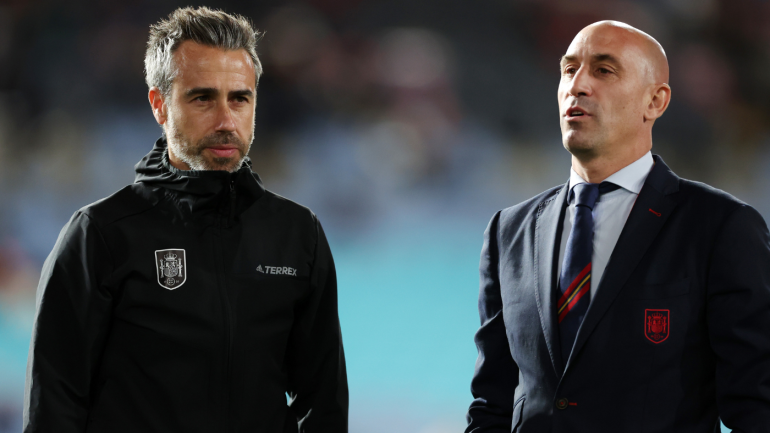
An announcement late on a Sunday is as anti-climactic as it gets, but regardless, the long-awaited news came. Luis Rubiales finally resigned as the Royal Spanish Football Federation (RFEF) president, three weeks after he forcibly kissed Jennifer Hermoso at the Women's World Cup final and invited the criticism of the world upon him.
He exited five days after the firing of Jorge Vilda, the women's national team coach who was one of the reasons 15 players refused to play for their country a year ago and a Rubiales ally. The duo's departure feels like the end of a lengthy saga that sadly overshadowed Spain's first-ever Women's World Cup title. It should, instead, be treated as the first step of a lengthy process to rid Spanish soccer of habitual misogyny that has disadvantaged the women's game.

CBS Sports HQ Newsletter
Your Ultimate Guide to Every Day in Sports
We bring sports news that matters to your inbox, to help you stay informed and get a winning edge.
Thanks for signing up!
Keep an eye on your inbox.
Sorry!
There was an error processing your subscription.
The problems pre-dated Rubiales and Vilda. You don't have to look any farther back than 2015, the first time Spain qualified for the Women's World Cup. The team traveled to Canada in economy class with two or three layovers, according to The Athletic, and played their opening match with jet lag after arriving just two days earlier. Training sessions were not much better. "We had been preparing for two or three weeks without playing any friendly matches for six months," former national team player Natalia Pablos told the publication. "The training was at the level of 25 years ago. The staff was half of what it is now. The analysis of the opposition was practically nil."
Verbally abusive head coach Ignacio Quereda was fired at the players' insistence and replaced by Vilda, but things did not improve with Rubiales in charge at the RFEF. Players still dealt with congested travel, arrived to match destinations too late, and felt training was insufficient.
Vilda also restricted their freedom during camp -- his controlling behavior allegedly included telling players to keep their hotel rooms open and inspecting their bags.
This inspired the aforementioned player protest, which revealed the federation's true colors. They backed Vilda and their practices and demanded players apologize instead of taking their complaints seriously. The federation made certain concessions to convince some to return to the national team, but seven players continued to challenge the RFEF. "I can't go back if the situation doesn't change," Mapi Leon said about skipping the World Cup. "There has to be changes. I'm not saying that they're not doing it, but I don't see them."
Want more coverage of women's soccer? Listen below and make sure to watch Attacking Third on Golazo Network Monday, Wednesday and Friday for all your USWNT, NWSL and WSL women's soccer coverage.
Enacting meaningful change must be the very first thing on the federation's agenda moving forward, especially considering 81 players in the pool -- including the entire World Cup winning squad -- are refusing to play after Rubiales dug his heels in. His departure, as well as Vilda's, does not guarantee their return. "It's not just about Rubiales resigning, there have been other changes like a new coach," defender Olga Carmona said, per Spanish media reports. "We will wait and between us we will have to talk."
Some of the solutions are fairly simple, and the players have already outlined them. Increased investment in the national team is a no-brainer, as is upgrading on Vilda. The World Cup winners also reportedly want an experienced manager, per The Athletic, which Vilda was not.
That's not the only problem that needs solving in the Spanish women's soccer landscape. Players in Liga F, Spain's top flight that hosts most of the World Cup team, are on strike amid a disagreement over minimum wage. The league has so far refused to meet the players' proposal of a minimum salary of $27,000 this season, in part the result of its own growth being stunted. Rubiales reportedly disapproved of a fully professional women's league, per The New York Times, though many others set the tone before him.
Investment alone is not the only solution to Spanish soccer's sexism, but it will go a long way. Proper funding is crucial to create a professional environment that breeds success, as well as healthy workplaces. As the findings of Sally Yates' 2022 independent report into NWSL abuse detailed last year, a lack of professionalism breeds unsafe environments because inappropriate behavior goes unpunished.
The good news is that the RFEF knows what the highest professional standard looks like -- its men's team was the benchmark for success when they won the World Cup in 2010 and were the team to beat for nearly a decade. The bad news is that the RFEF chose to operate its women's national team at the opposite end of the professional spectrum.
The rot is deep inside the federation. Rubiales' successor, Pedro Rocha, was reportedly hand-picked by him and the federation's board is made up of all men, several of whom did not feel the need to push Rubiales out the door, per Guillem Balague. It seems like Rubiales' allies stopped backing him only to preserve Spain's bid to co-host the 2030 World Cup with Portugal, Morocco, and Ukraine. He primarily cited the desire to protect that effort as the reason for his resignation, and still refuses to take accountability for his actions at the Women's World Cup final.
The new leaders also seem insistent on maintaining the status quo. The federation, once Rocha assumed the reins, also reportedly took issue with men's team captain Alvaro Morata's desire to use the word "equality" in a statement supporting Jennifer Hermoso. It is clear the rot is deep inside Spanish soccer circles.
Those on the outside could force change. While Rubiales faces the possibility of criminal charges for the forced kiss, the government could seek to change the country's sports laws to become even harsher on misconduct after updating its regulations last year. Government officials also hope that an election for the new RFEF president happens sooner than the originally scheduled date after next year's Olympics.
Though Rubiales and Vilda are gone, the battle to better women's soccer in Spain is far from over. It is imperative to remember that as the federation enters a new era, and as we wait to see if the leaders pretend problems are solved -- or if they actually begin to enact much needed change.
















